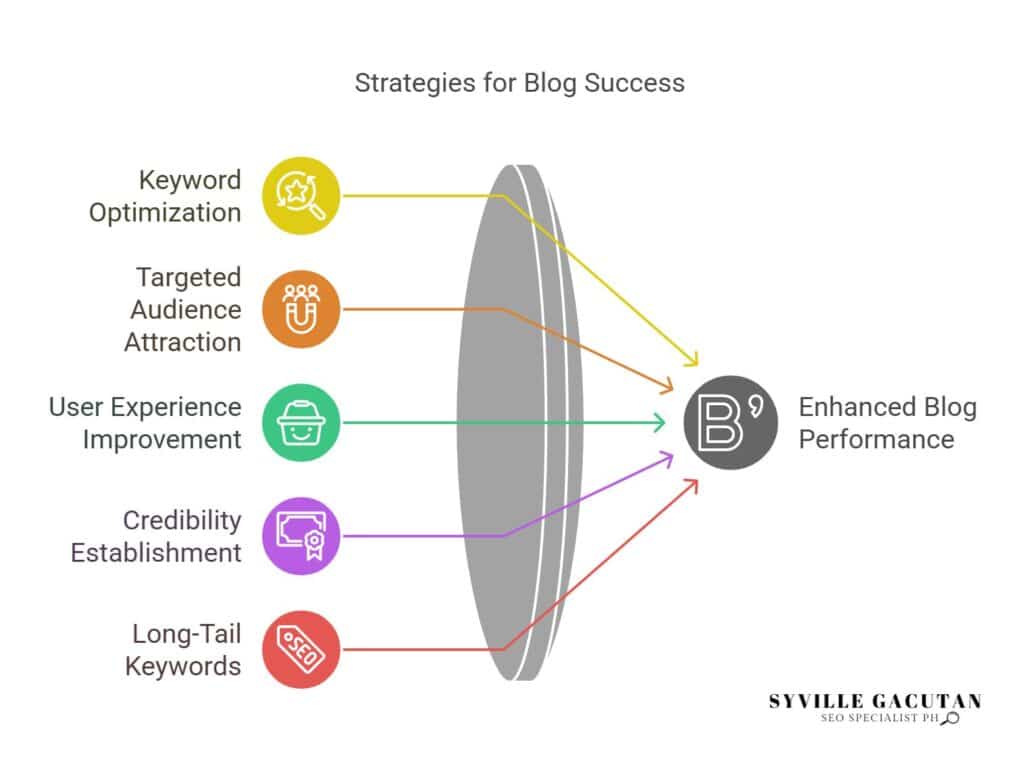
Why Does Keyword Optimization Matter for Your Blog?
Keyword optimization is essential for blog success as it directly impacts visibility and organic traffic. By strategically incorporating relevant keywords, blogs can rank higher on search engines, attracting a broader audience. This not only establishes credibility and authority within a niche but also enhances user experience by aligning content with search intent. Effective keyword strategies ensure that content reaches the right audience, fostering engagement and loyalty. Leveraging long-tail keywords can give a competitive edge by targeting specific search queries with higher conversion rates. These strategies are pivotal in establishing a robust online presence and gaining more insights into the SEO keyword optimization techniques for blogs.
Key Takeaways
- Keyword optimization boosts search engine rankings, increasing your blog’s visibility.
- It attracts a targeted audience by aligning content with user search intent.
- Improves user experience when using a product or service by giving them information and materials that are interesting and useful.
- Establishes credibility and authority within your niche, fostering trust.
- Using long-tail keywords improves conversion rates and drives quality traffic.

Importance of Keyword Optimization

Keyword optimization is key to a successful blog strategy because it directly impacts how visible and far-reaching your content is.Bloggers should use important words that people search for on the internet. This helps search engines like Google find their blog posts. When search engines can find the blog posts more people will read them. Understanding the importance of keyword optimization begins with recognizing its role in enhancing search engine visibility.
Incorporating SEO best practices is essential for achieving effective keyword optimization. This process requires doing detailed research to find the words & phrases that people are searching for online. By looking at what terms potential readers are typing into search engines you can identify the most relevant keywords to target. By targeting specific keywords, bloggers can create content that matches user intent, helping their posts rank higher in search engine results pages (SERPs). Improved rankings are essential for driving organic traffic since users are more likely to click on links that show up on the first page of search results.
Content optimization is an important part of keyword optimization. This means carefully placing keywords in different parts of the blog, like the title, headings, meta descriptions, & the main text. By using simple words and clear language you can help search engines comprehend the topic of your blog and display it to individuals searching for related keywords. By using simple language & avoiding complex words your content becomes more visible and accessible to a wider audience. This allows more people to understand and engage with the information you’re sharing.
Keyword stuffing is the practice of excessively repeating certain words or phrases on a webpage in an attempt to manipulate search engine rankings. This technique is considered a form of spam and can lead to negative consequences from search engines. When a webpage contains too many instances of specific keywords, it becomes difficult for users to read and understand the content. Search engines like Google aim to provide high-quality and relevant results to their users. As a result, they have algorithms in place to detect and penalize websites that engage in keyword stuffing.
Instead of relying on keyword stuffing, it is recommended to create high-quality informative, and engaging content that naturally incorporates relevant keywords in a meaningful way. This approach not only improves the user experience but also aligns with search engine guidelines, ultimately leading to better search visibility and higher rankings. The primary objective should be to produce content that is of superior quality, offers valuable information and maintains the reader’s attention throughout. This content should naturally incorporate the specific keywords that are being targeted.
Ultimately, keyword optimization is not just about increasing visibility but also about providing value to the audience. By following SEO best practices and conducting thorough keyword research, bloggers can produce content that is both search-engine-friendly and relevant to readers, thereby enhancing the overall effectiveness of their blog strategy.
Boosting Search Engine Rankings

Boosting search engine rankings is a pivotal goal for any blog seeking to enhance its online presence. By incorporating the right keywords into their blog posts, writers can make it easier for people to find their content through search engines like Google which helps them reach more readers.
Keyword optimization involves the strategic use of relevant keywords within your content, meta descriptions, and headings to align with the search queries of your target audience.
A higher search engine ranking is often the result of meticulous keyword research. Utilizing a keyword research tool can help identify high-value keywords that are both relevant to your content and frequently searched by users. These tools provide insights into keyword difficulty, search volume, and competition, enabling you to make informed decisions about which keywords to target.
Once you have identified suitable keywords, the next step is to optimize your content. This includes incorporating primary and secondary keywords naturally within your text, ensuring that your content remains engaging and informative.
Additionally, optimizing your meta tags, alt texts for images, and internal linking structure can further enhance your blog’s search engine ranking.
Moreover, search engines prioritize content that offers value to users. Therefore, maintaining a high standard of quality in your blog posts, combined with keyword optimization, can help boost search engine rankings.
Regularly updating your content to reflect the latest trends and information can also keep your blog relevant and ranked higher in search results.
Increasing Organic Traffic
Achieving higher search engine rankings naturally leads to an increase in organic traffic, as visibility on search engines directly correlates with the number of visitors to your blog.
Keyword optimization is a critical component in this process, as it ensures your content is aligned with what users are searching for. By strategically incorporating relevant keywords, you can enhance your blog’s search engine optimization (SEO) and drive traffic more effectively.
Keyword research is the foundation of keyword optimization. It involves identifying the terms and phrases potential visitors use when searching for information related to your blog’s content.
Once you have a list of targeted keywords, you can integrate them into your blog posts, meta descriptions, and headlines to improve your blog’s visibility on search engine results pages (SERPs).
Here are four essential steps to increase organic traffic through keyword optimization:
- Conduct Thorough Keyword Research: Utilize tools like Google Keyword Planner or Ahrefs to find high-volume, low-competition keywords that are relevant to your niche.
- Optimize On-Page Elements: Ensure that your blog titles, headers, meta descriptions, and image alt texts include your targeted keywords to improve SEO.
- Create High-Quality Content: Write informative and engaging content that naturally incorporates your keywords, providing value to your readers and encouraging them to stay longer on your site.
- Build Backlinks: Generate backlinks from reputable sites to increase your blog’s authority and improve its ranking on SERPs, thereby driving more organic traffic.
Enhancing User Experience

Enhancing user experience is pivotal in maintaining and growing your blog’s audience. When readers find your content engaging and easy to navigate, they are more likely to return and recommend your blog to others. This is where keyword optimization plays a crucial role. By integrating relevant keywords seamlessly into your content, you can ensure that it aligns with the search intent of your audience, thereby enhancing user experience.
Implementing effective SEO strategies not only helps in ranking high on search engine result pages (SERPs) but also in providing value to your readers. When users find exactly what they are looking for quickly and efficiently, their satisfaction with your blog increases. This can be achieved by understanding the search intent behind the keywords you are targeting and crafting content that meets those needs.
Here’s a practical way to see how keyword optimization can enhance user experience:
| Aspect | Without Keyword Optimization | With Keyword Optimization |
| Content Relevance | Low | High |
| User Engagement | Decreased | Increased |
| Bounce Rate | High | Low |
| Return Visits | Rare | Frequent |
Targeting the Right Audience

Understanding demographic nuances and audience segmentation is fundamental to the success of your blog. Effective keyword optimization entails more than just selecting high-volume search terms; it involves targeting the right audience with precision.
When you align your content with the needs and interests of your target demographic, you increase engagement, drive traffic, and foster loyalty. Here’s how to ensure your keyword strategy effectively targets the right audience:
- Conduct Keyword Research: Begin by identifying terms and phrases that your target audience is likely to use. Tools like Google Keyword Planner and SEMrush can provide insights into search volumes and trends. This initial step is crucial for generating a list of potential target keywords.
- Analyze Audience Demographics: Utilize analytics tools to gather data on your current audience, including age, gender, location, and interests. Understanding these demographics helps you tailor your content and select keywords that resonate with your audience.
- Segment Your Audience: Create detailed segments within your broader audience based on specific characteristics and behaviors. This allows for more nuanced keyword optimization, ensuring that each segment finds content that addresses their unique needs and preferences.
- Implement Blog SEO Tips: Incorporate your target keywords naturally within your content, including headings, meta descriptions, and alt texts. This not only improves your blog’s search engine visibility but also ensures that the content is relevant and valuable to your readers.
Competitive Advantage

Gaining a competitive advantage in the crowded blogosphere requires more than just quality content; it demands strategic keyword optimization. In an environment where countless blogs vie for the same audience, leveraging keyword optimization enables your content to rank higher on search engine results pages (SERPs). This, in turn, increases your blog’s visibility and attracts a larger share of organic traffic.
Search engine algorithms play a pivotal role in determining which content appears at the top of SERPs. These algorithms evaluate various factors, one of the most significant being the relevance and strategic placement of keywords. By incorporating carefully researched keywords into your blog posts, you signal to search engines that your content is pertinent to users’ queries. This alignment not only boosts your chances of ranking higher but also establishes a strong foundation for SEO success.
Moreover, keyword optimization is not just about visibility—it is about relevance. When your blog consistently appears in top search results, it enhances your credibility and authority within your niche. Readers are more likely to engage with and trust content that ranks well, perceiving it as authoritative and reliable.
This trust can translate into increased readership, higher engagement rates, and ultimately, a loyal audience base.
Long-Tail Keywords Benefits
Tapping into the power of long-tail keywords can significantly elevate your blog’s search engine performance. Unlike short, broad keywords, long-tail keyword phrases consist of three or more words and target more specific search intents. This specificity is crucial in an era where search engines prioritize user intent and relevancy.
Long-tail keywords offer several benefits that enhance your blog’s visibility and attract more targeted traffic:
- Higher Conversion Rates: Users searching long-tail keyword phrases typically have a clear intent, making them more likely to convert compared to those using generic terms. By aligning your content with these specific inquiries, you can attract visitors who are ready to take action.
- Less Competition: Broad keywords are highly competitive, making it challenging to rank high in search engine results. In contrast, long-tail keywords face less competition, allowing your blog to achieve better rankings more easily. Effective keyword optimization with long-tail phrases can give your blog the edge it needs to stand out.
- Improved User Experience: Content tailored to long-tail keywords tends to be more detailed and specific, thereby enhancing the user experience. Visitors find the exact information they’re looking for, increasing engagement and the likelihood of return visits.
- Increased Traffic Over Time: While long-tail keywords may initially attract less traffic compared to broad terms, they steadily build a loyal audience. As your blog gains authority and trust, the accumulated traffic from these specific searches can significantly boost overall traffic to your blog.
Final Thoughts
Keyword optimization is a fundamental aspect of successful blogging that cannot be overlooked. By strategically incorporating relevant keywords, bloggers can significantly enhance their visibility on search engines, attract targeted audiences, and ultimately drive organic traffic. Understanding the importance of keyword research, content optimization, and user intent is key to crafting effective blog posts that resonate with readers. Additionally, leveraging long-tail keywords provides a competitive advantage, improving conversion rates and fostering user engagement.
If you’re ready to optimize your blog for SEO success, connect with Syville Gacutan, an experienced SEO Specialist in the Philippines. Syville can help you master keyword strategies, enhance your blog’s visibility, and drive organic traffic. Don’t miss the opportunity to boost your blog’s performance—reach out today!